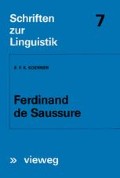Abstract
Our study has been inspired above all by a twofold concern; firstly, we believe that two generations after the publication of the Cours general linguistic theory has not yet been accorded its proper place in linguistics, and secondly that the history of linguistic thought has not yet attained an acceptable level of maturity. While we note that in recent years, perhaps largely as a result of Chomsky’s Aspects of 1965, more scholars have directed their attention to the discussion of general problems in linguistic theory, the history of these ideas which has occupied the human mind ever since an awareness of language developed, however, is still in leading strings.
Die paritätische Verbindung von Mikroskopie und Makroskopie bildet das Ideal der wissenschaftlichen Arbeit; in Wirklichkeit kommt meistens die eine gegenüber der anderen zu kurz.
Hugo Schuchardt in 1909*
Même si le Cours de linguistique générale de Ferdinand de Saussure devait un jour être vieilli dans toutes ses parties, il serait destiné à vivre encore dans le souvenir de la science du langage à cause de l’action puissante et féconde qu’il a exercée à un moment de son évolution.
Albert Sechehaye in 1940 (VR 5:1)
Nous disons ici que Saussure appartient désormais à l’histoire de la pensée européenne. Précurseur des doctrines qui ont depuis cinquante ans transfbrmé la théorie du langage, il a jeté des vues inoubliables sur la faculté la plus haute et la plus mystérieuse de l’homme . . .
Emile Benveniste in 1963 (CFS 20:21)
Access this chapter
Tax calculation will be finalised at checkout
Purchases are for personal use only
Preview
Unable to display preview. Download preview PDF.
Footnotes
Cf. Schuchardt in Revue internationale des études basques (Paris) 3:135 (1909); repr. in Hugo Schuehardt-Brevier, p. 410.
For an example of how the history of linguistics should not be written, s. K. V. Teeter’s review of Waterman’s Perspectives in Linguistics (Chicago Univ. Press, 1963) in Language 41:512–8 (1965).
Exceptions to the rule have been mentioned whenever such a reference appeared justified; e.g. Ivić’s and Helbig’s insightful observations about the theories of Hermann Paul (cf. 1.3.2.2).
Cf. R. Jakobson’s fine distinction between the achievements of Paul’s Prinzipien and FdS’s Cours (SW I, 294), and also Bühler’s (1965: 6f.) observations to this effect.
Cf. H. Weinrich. “Münze und Wort: Untersuchungen zu einem Bildfeld”, Romanica: Festschrift für Gerhard Rohlfs ed. by H. Lausberg and H. Weinrich (Halle/S.: M. Niemeyer, 1958), 508–21.
Where the influence of Hegelian philosophy on FdS is concerned, we concede that so far no particular linguistic source has been found through which FdS might have absorbed certain notions which play an important part in his linguistic argument and which we believe to be “adhésions hegeliennes” (cf. 2.2.1.1 and 2.3). V. Henry’s Antinomies linguistiques (Paris: F. Alcan, 1896) do not, to any noticeable degree, exhibit Hegelian ideas which could have led to the Saussurean argument about the distinctive, oppositive, and essentially negative relations between linguistic elements and the concept of identity.
We are inclined to believe that A. Naville’s pamphlet, La Logique de l’identité et celle de la contradiction: Notes critiques (Geneva: Georg, 1909), might have had an influence on FdS’s linguistic argument.
Cf. Lévi-Strauss, “Critères scientifiques dans les disciplines sociales et humaines”, Aletheia (Paris) 4:189–212 (May 1966), esp. pp. 200ff. S. also
B. Malmberg’s comment in SL 20.2:124–6 (1966), in particular his curious remarks on what he believes to have been “le but des grands linguistes de notre époque” (p. 126).
Lévi-Strauss, loc. cit.
Rights and permissions
Copyright information
© 1973 Friedr. Vieweg + Sohn GmbH, Braunschweig
About this chapter
Cite this chapter
Koerner, E.F.K. (1973). CONCLUSION: Saussure’s Cours and the State of Linguistic Science. In: Ferdinand de Saussure. Schriften zur Linguistik, vol 7. Vieweg+Teubner Verlag. https://doi.org/10.1007/978-3-322-85606-7_4
Download citation
DOI: https://doi.org/10.1007/978-3-322-85606-7_4
Publisher Name: Vieweg+Teubner Verlag
Print ISBN: 978-3-528-03706-2
Online ISBN: 978-3-322-85606-7
eBook Packages: Springer Book Archive

